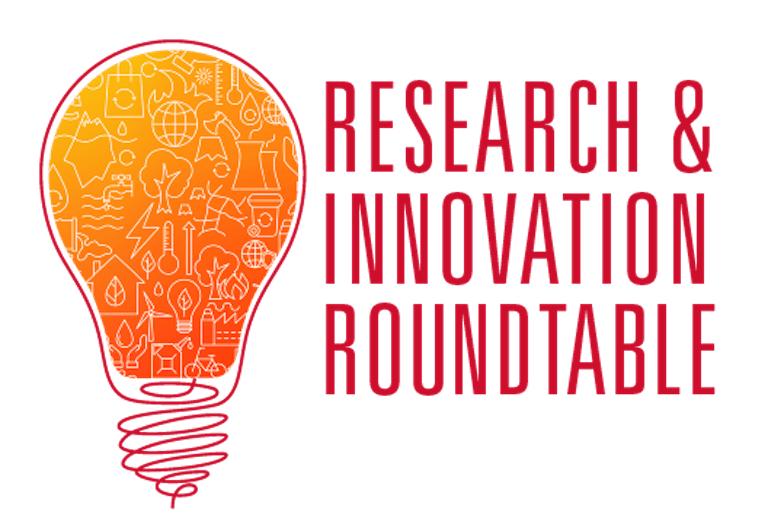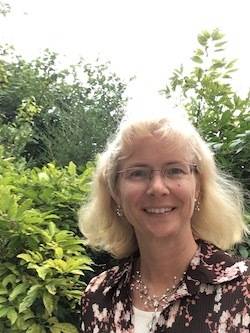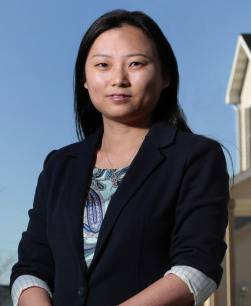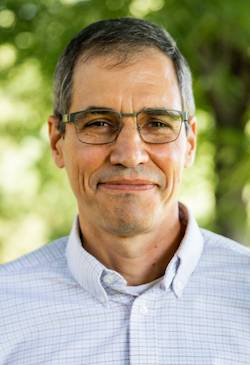Three Proposals From Fall RIR Receive Presidential Jump Start Seed Funding
Posted Feb 27, 2023

The first of two Research & Innovation Roundtables (RIR) slated for the 2023 fiscal year yielded three interdisciplinary research proposals that are receiving Iowa State Strategic Plan Presidential jump start seed funding.
Each RIR is structured to bring together diverse disciplines and points of view from around the university in a collaborative environment to surface big and bold interdisciplinary research ideas. Faculty members share their respective interests and areas of expertise then participate in topic-specific breakout sessions. Each breakout group reports their top take-aways and the entire gathering is given time to encourage self-assembly team formation.
Nearly 60 Iowa State faculty participated in the fall semester RIR November 29, 2022. That session was centered on the overarching Climate Smart issue, covering topics and research opportunities that ranged from circular economies for climate to green energy production to climate-smart community design and social justice to sustainable and regenerative agriculture and more.
The fall semester resulted in five teams forming and submitting project proposals and seed funding applications. All proposals were evaluated by program facilitators. Those selected for funding had to be connected to the Iowa State 2022-2031 Strategic plan and the teams had to be comprised of members from different disciplines who employ different research approaches and methods.
Peter Dorhout, Iowa State Vice President for Research is encouraged by the campus research community’s engagement with the RIR program.
“Our biggest challenges – like climate’s impact on our world and our communities – require novel solutions that are born out of a diversity of perspectives, disciplines, and methodologies,” Dorhout said. “The leadership in the VPR office is delighted with the results of the first Research Innovation Roundtable of the 2023 fiscal year. The program was a convergence of ideation, across many disciplines, that led to the submission of outstanding proposals from five self-formed teams. We’re delighted to support the three projects that we believe most closely align with the new university strategic plan, and we’re excited to continue this program to foster greater collaboration, discovery, and innovation.”
Here, then, is an overview of the projects selected for presidential jump start seed funding after the fall Research & Innovation Roundtable.
S[t]imulating Climate-smart Conservation on Iowa’s Farmland: Incorporating Collaborative Storytelling into Integrated Modeling
Principal Investigator: Linda Shenk, associate professor, English
Co-PIs:
- Richard Cruse, professor, Agronomy; administrative co-lead of the Agricultural Conservation Planning Framework (ACPF) National Hub; director of the Iowa Water Center
- Hongli Feng, assistant professor, Economics
- Kristie Franz, professor, Geological and Atmospheric Sciences
- Brian Gelder, manager research and adjunct assistant professor, Agricultural and Biosystems Engineering, Agronomy and Community and Regional Planning
- William Gutowski, Jr., professor, Geological and Atmospheric Sciences
- Emily Zimmerman, assistant professor, Natural Resource Ecology and Management; administrative co-lead of the ACPF National Hub
Core Investigator:
- Daryl Herzmann, Agronomy
Proposed project summary

Climate researchers have failed to build sufficient trust and partnerships with stakeholders in Midwest agriculture, which has limited the adoption of climate-smart conservation practices. This problem has arisen, in part, because scientists often share with the public climate-model projections related to extreme events, but stakeholders in agriculture face more subtle climate risks. For them, damaging events can be the increasing frequency of two-inch rains in early spring that produce erosion and nutrient runoff or the fluctuations between flash-droughts and downpours that disrupt critical growing periods. The dramatic narratives of climate change they encounter do not match the erosion, runoff, and smaller-event situations that affect them frequently and are likely to become more intense with continuing climate change.
This project addresses this disconnect by integrating – for the first time – a suite of existing climate-farmland-social-economic simulation models and engages stakeholders in agriculture with these models through principles of collaborative storytelling that enable researchers and stakeholders to co-produce knowledge by co-producing narratives. The process allows stakeholders to partner with researchers in co-creating “storylines” around impactful weather and the socio-economic risk-factors that influence stakeholders’ decision-making. In turn, researchers expand their techniques for using simulation models as collaborative, storytelling devices to stimulate the conversations and foster the trust that are necessary for climate-smart action.
“This opportunity has allowed us to build a team of researchers who bring different types of storytelling—from the humanities, from economics, from geophysical simulation—all into conversation to support some of the most potentially powerful but under-represented stakeholders in Midwest agriculture,” said PI Linda Shenk. “Many of us had never met before the Climate Smart workshop, and we are excited to begin our collaboration with each other and our community partners.”
University Strategic Plan aspirational statements this plan advances
- To be the trusted partner for proactive and innovative solutions
- To be the university that creates opportunities and forges new frontiers
- To be the most student-centric leading research university
Potential external funding partners and opportunities
This work will lay the foundation for the team to apply for funding from the National Oceanic and Atmospheric Administration’s (NOAA) Climate Adaptation Partnerships program, the National Science Foundation’s (NSF) Coupled Human Natural Systems (CNH) and Smart & Connected Communities programs, and the Department of Energy’s Multisector Dynamics program. Significant ties in Iowa and focus on water, land use, conservation, and climate position the team well to apply for: the National Resources Conservation Service’s (NRCS) Conservation Innovation grants; Iowa Department of Agriculture and Land Stewardship (IDALS) funding from the State Soil and Water Quality Conservation Committee; and the Iowa Department of Natural Resources (IDNR) – Environmental Protection Agency (EPA) 319 Watershed Planning Assistance grants.
Improving Understanding of Climate Justice for Vulnerable Groups Through Communication and Community Engagement
Principal Investigator: Yu Wang, associate professor, Political Science
Co-PIs:
- Jane Rongerude, associate professor, Community and Regional Planning
- Lu Liu, assistant professor, Civil Engineering
Proposed project summary

Although climate events are serious threats and pose heightened risks to socially vulnerable populations, Americans generally view climate change as a moderate risk and typically see no urgent need to act. Perceptions of climate risks by the public and by elected officials are often affected by worldview and ideology rather than science. This lack of awareness often compounds justice-related challenges since disadvantaged communities that bear a disproportionate share of climate change’s impact also have the fewest resources to address or mitigate these risks.
This project is focused on finding solutions for improving local climate justice outcomes by enhancing understanding of how vulnerable groups view and respond to climate risks. The research team will gather data through a statewide quantitative survey and through community-based qualitative methodologies – focus groups and interviews. The research will focus on finding answers to the questions of: 1) What does climate justice mean to socially vulnerable populations; and 2) How can communication and community engagement improve awareness of climate justice needs? This approach will enhance the team’s knowledge and understanding of individual perceptions of climate risks and responses while also identifying the most effective communications and community engagement strategies.
“This project will start a new collaborative research team that bridges climate science and local community needs, improving understanding and communication in both directions,” said PI Yu Wang. “Data from this project will greatly increase the team’s capability to compete for external fundings in this active field of energy, climate change, and justice.”
University Strategic Plan aspirational statement this plan advances
- To be the university that creates opportunities and forges new frontiers
Potential external funding partners and opportunities
Potential external funding sources for a larger-scale research proposals based on the findings of this project include: NSF (in particular, the Civic Innovation Challenge); EPA; U.S. Department of Agriculture (USDA) National Institute of Food and Agriculture (NIFA), Department of Energy (DOE); and other agencies when the bipartisan infrastructure bill and Inflation and Reduction Act provide significant funding resources for research projects on the electric power infrastructure, energy storage, electric vehicles, and other relevant topics.
Strengthening Stormwater Infrastructure in Marginalized Communities Through Social Justice Indicators
Principal Investigator: Chris Rehmann, associate professor, Civil, Construction and Environmental Engineering
Co-PIs:
- Jane Rongerude, associate professor, Community and Regional Planning
- Lu Liu, assistant professor, Civil Engineering
- Cristina Poleacovschi, assistant professor, Civil, Construction and Environmental Engineering
- Kaoru Ikuma, assistant professor, Civil, Construction and Environmental Engineering
Proposed project summary

Stormwater management has become an important aspect of responsible and socially just urban development, especially under climate change. Ill-managed stormwater can lead to problems in both water quantity (flooding) and quality (e.g., spread of stormwater pollutants such as nutrients, heavy metals, pathogens, and petroleum products). These outcomes can harm surrounding communities, particularly those excluded from social, economic, educational, and cultural life because of race, gender, age, physical ability, immigration status and other social factors. Especially worrisome is that the marginalized communities that are more likely to experience the consequences of ill-managed stormwater are also less likely to have the resources to recover.
The team behind this project proposes creating social justice stormwater indicators (SJSIs) to improve planning and decision-making processes leading to better social justice outcomes and more effective public stormwater infrastructure. The SJSIs would be established through a two-step pilot study in Des Moines, Iowa. Phase one would employ a qualitative approach that would outline the impacts stormwater events have on marginalized communities. Phase two would be a larger quantitative study to validate these opinions and perspectives across a larger sampling in Des Moines. In addition to creating the SJSI’s, the project team will also start constructing a stormwater model of the city of Des Moines to explore the effects of changes to the stormwater infrastructure and to generate information that can be shared stakeholders.
“We are excited to use this seed funding to learn the languages of all disciplines involved in the project and develop the relationships with communities and organizations in Des Moines that will be critical for designing infrastructure that works well for everyone,” said PI Chris Rehmann.
University Strategic Plan aspirational statement this plan advances
- To be the university that cultivates a diverse, equitable, and inclusive environment where students, faculty, and staff flourish
- To be the university that creates opportunities and forges new frontiers
- To be the trusted partner for proactive and innovative solutions
Potential external funding partners and opportunities
The project team considers the following agencies and programs to be strong options for research proposal submissions in the near future:
- EPA Science to Achieve Results (STAR) and National Priorities programs;
- NSF Strengthening American Infrastructure (SAI);
- NSF Humans Disasters, and the Built Environment (HDBE); and
- The current NSF EPSCoR Track 2 program topic: “advancing climate change research and resilience capacity to expand opportunities for disproportionately affected communities.”
